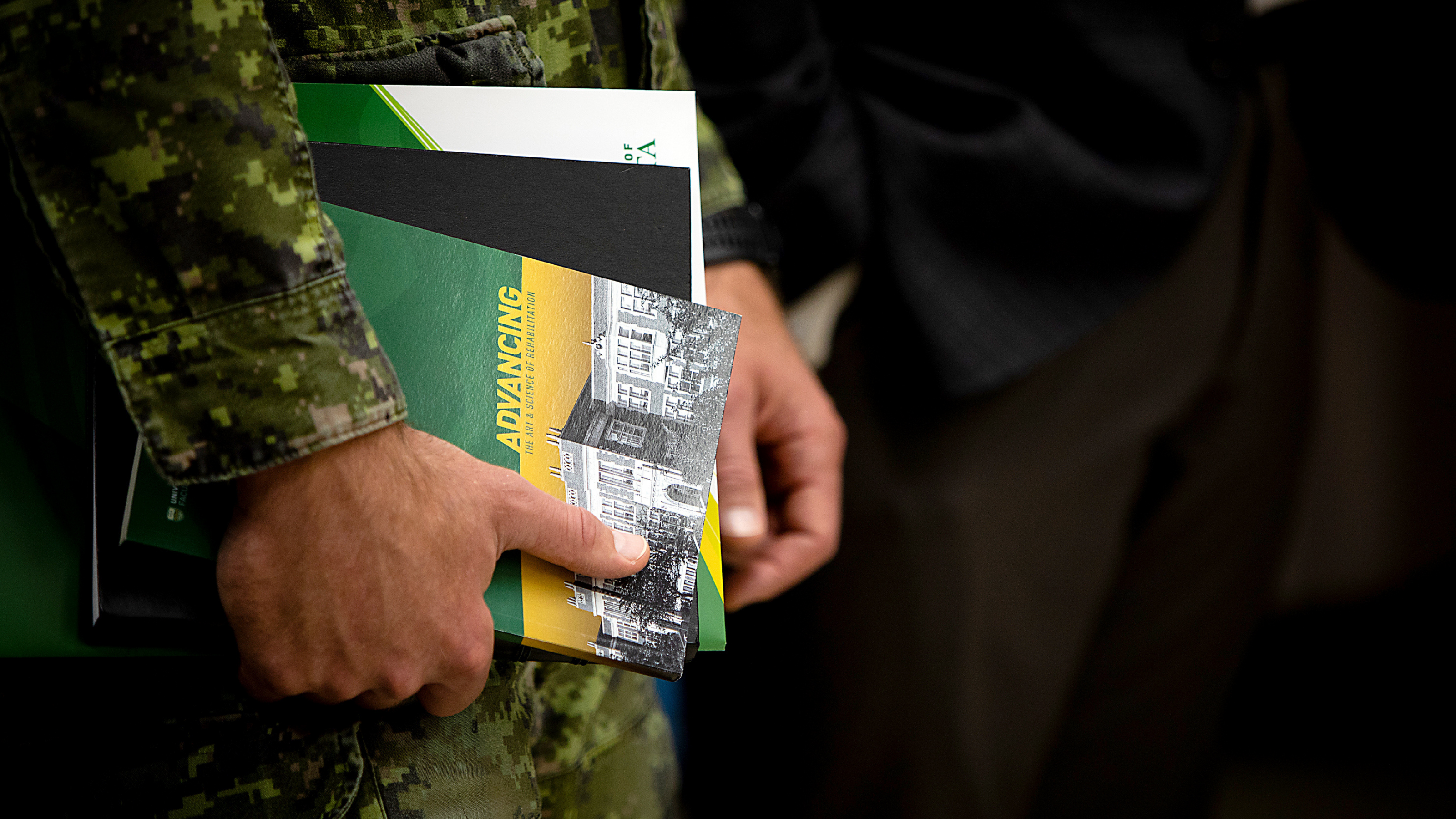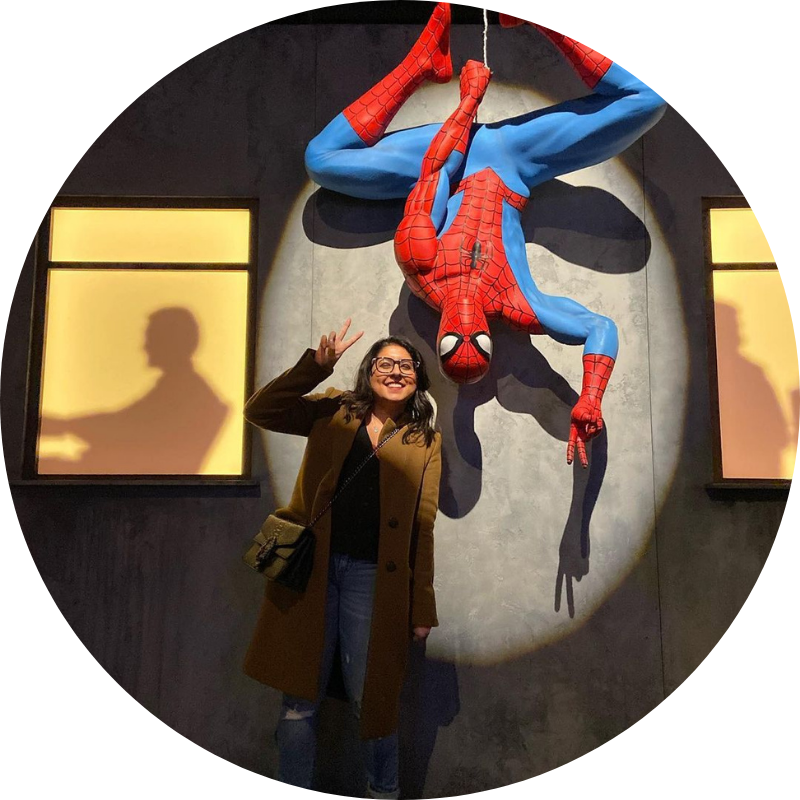Veterans are an important part of our community year-round, and around Remembrance Day we are reminded to honour and remember those who have fallen, and those who are both serving or have served in the Canadian military.
Earlier this year, the University of Alberta introduced the Veteran-Friendly Campus (VFC) pilot program to provide veterans pursuing post-secondary education with the option to access supports specific to their unique needs. These specialized supports focus on improving veterans' transition to campus life, including learning assessments that take into account their existing military training and attributes, peer support, veterans’ study groups and specialized advising. The VFC is also connected with Veterans Affairs Canada and the Canadian Armed Forces to provide an even broader network of support to veterans who come to the U of A to study.
For an update on the VFC program, and to get to know some of our community members who are veterans, meet students Cassandra Elliott and Gabriel Landry:
Transitioning to campus
Prior to joining the U of A as an undergraduate student in the Faculty of Arts, majoring in psychology, Gabriel Landry served for more than 13 years in the Royal Canadian Air Force as an aviation system technician.
“I chose to study at U of A because I had done some research on which university had the best reputation and programs, and the U of A was at the top,” Gabriel says.
Though Gabriel just started his studies this semester, he has already made connections with other members of the U of A’s veteran community through weekly Veteran Connect meetings offered by the Office of the Dean of Students. “The meetings are a great place to be able to network with other veterans and educate myself on the different support resources the university has to offer,” Gabriel says. These meetings are just one of the many ways the VFC offers a community of support for veterans on campus, bringing together students who have served in the military along with university faculty and staff.
The transition from military life to a civilian one isn’t without challenges, though. Gabriel came to the U of A with more than a decade of experience, but university classes require a different set of skills. “I hadn’t been in a civilian school setting in a really long time, so it was a bit of a culture shock," Gabriel says. Despite ongoing changes and Covid-19 restrictions this fall semester, Gabriel has had the opportunity to attend in-person classes. “The experience has been just amazing. I am able to engage with my instructors and they have been very supportive. I have really enjoyed my classes so far.”
Fine-tuning skills
Graduate student Cassandra Elliott served just under eleven years in the Canadian Armed Forces as a vehicle technician before deciding to pick up the university studies she had started prior to joining the military. Cassandra is currently pursuing a Master of Education in Counselling Psychology in the Faculty of Education, and her research focuses on factors that could contribute to transition difficulty for veterans. Though most of her time is dedicated to her studies, Cassandra is passionate about veteran advocacy projects. She is interested in work that addresses the sexual misconduct crisis in the military, and consults with various stakeholder groups on these issues.
Within U of A's veteran community, Cassandra is undoubtedly a leader. She has been working to develop a virtual hub currently housed on Discord that can bundle together the resources offered by the VFC program in one location–everything from study skills and accommodations to mindfulness and productivity. The VFC student hub aims to help strengthen the transferable skills veterans already have. For example, writing reports is common in the Canadian Forces, but writing for academia is different.
"It’s a matter of mobilizing existing skills and fine-tuning them to a new environment. When I went back to university, I was like, how do you write a paper? What’s a paper?” Cassandra laughed. For the first few years, she had her best friend and her sister edit her papers and tutor her on improving her writing skills. As she grew better equipped to write academically, her grades improved and, with that, so did her confidence.
Confronting stereotypes and mindful communication
While every veteran’s experience is personal, Gabriel and Cassandra agreed that first and foremost veterans are more than just their military experiences. Veterans are everyday people with intersecting identities, one of which is that of a former soldier. They’re also students, leaders, pet parents (Cassandra recently got a new puppy!), friends and neighbours. “There’s a stigma that we just suffer, or that we’re less capable because of what we’ve experienced,” Cassandra says.
The holistic perspective that the VFC is building will be used to identify factors that can lead to veteran success at the U of A, and address the needs of veterans within the academic community. “When you want to develop better programs and identify barriers, you need to look at the whole picture and not generalize veterans,” Cassandra says. "A common misconception about veterans is that, in order to succeed, soldiers need grit and motivation and, if they don’t have that, they won’t succeed. I had the motivation, I had the grit, but if I didn’t have the support that was available in my life, I would have never gotten here.”
Building a community of support
For both Gabriel and Cassandra, the importance of a veteran-led and informed program can’t be understated. For Gabriel, finding those connections with others who have gone through the same transition as him has proven to be invaluable. While the U of A has a number of supports for all students, the VFC provides a community-based approach to supporting students who are veterans. “The bigger the community grows, the more definition and prevalent it becomes, the more active we are within the greater community, and the more we can build purpose and gain validation from our peers," Gabriel says.
A day for personal reflection
Veterans are a diverse group, and every veteran commemorates November 11 differently. For Cassandra, it’s a private, personal day, though she also acknowledges that it is an important opportunity to engage with the broader community about military issues. It is a day to remember those who sacrificed their lives during war, and a day to reflect on the challenges that veterans face now. "I notice people wearing poppies on campus and it's nice to see that kind of recognition throughout the beginning of November," Cassandra says. "It's comforting to know that people are mindful that things are going on and recognize that this is an important time for us."
For more information about the Veteran-Friendly Campus initiative, please visit the website or email vfc@ualberta.ca.

 About Sabrina
About Sabrina